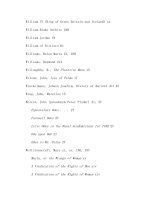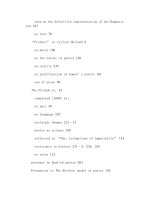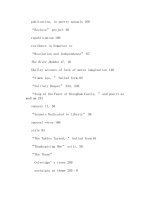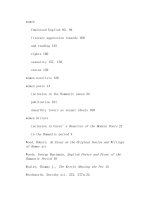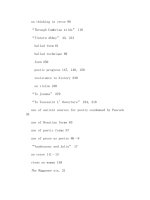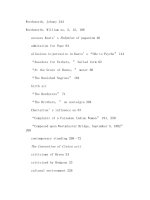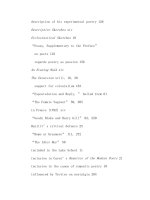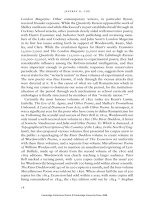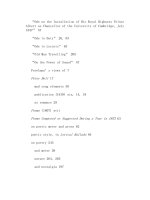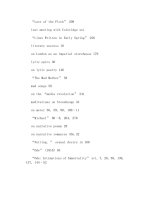The cambridge companion to british roman 40
Bạn đang xem bản rút gọn của tài liệu. Xem và tải ngay bản đầy đủ của tài liệu tại đây (39.28 KB, 1 trang )
j e f f r e y n . c ox
London Magazine. Other contemporary writers, in particular Byron,
received broader exposure. While the Quarterly Review opposed the work of
Shelley and Keats and while Blackwood’s in part established itself through its
Cockney School attacks, other journals clearly sided with innovative poetry,
with Hunt’s Examiner and Indicator both publishing and reviewing members of the Lake and Cockney schools, and John Scott’s London Magazine
in its first few issues setting forth its support of Wordsworth, Keats, Shelley, and Clare. While the circulation figures for Hunt’s weekly Examiner
(3,000–7,000) and The London Magazine (2,000) were not as high as the
reactionary Quarterly Review (12,000–14,000) or The Edinburgh Review
(12,000–13,000), with its mixed response to experimental poetry, they had
considerable influence among the Reform-minded intelligentsia, and they
were important enough to provoke vitriolic responses from conservative
periodicals. The intensity of these reviews, pro and con, suggests how much
was at stake for the “writerly nation” in these volumes of experimental verse.
The new poetry was thus known, if only through the vicious attacks that
were directed at it. It is this canon of what we call Romanticism which in
the long run comes to dominate our sense of the period, for the institutionalization of the period through such mechanisms as school curricula and
anthologies is finally structured by members of this “writerly nation.”12
Certainly the most famous volumes of 1820 today are Keats’s Lamia,
Isabella, The Eve of St. Agnes, and Other Poems, and Shelley’s Prometheus
Unbound: A Lyrical Drama in Four Acts, with Other Poems. In retrospect, it
was a significant year for the poets who have come to define Romanticism for
us. Following the scandal and success of Peter Bell in 1819, Wordsworth not
only issued a well-received new volume in 1820 (The River Duddon, A Series
of Sonnets: Vaudracour and Julia and Other Poems. To Which is Annexed, A
Topographical Description of the Country of the Lakes, In the North of England), but also prepared various volumes that presented his corpus anew to
the public: a repackaging of the River Duddon volume to create volume iii
of Wordsworth’s Poems, a second edition of The Excursion set uniformly
with these three volumes, and a separate four-volume Miscellaneous Poems
of William Wordsworth, not to mention an unauthorized reprinting of Lyrical Ballads, made up of sheets from the second volume of the 1800 and
1805 editions. Wordsworth was clearly reaching a larger audience. Peter
Bell marked a turning point, with 1,000 copies (rather than the usual 500
for Wordsworth) being issued and with 700 being sold within about a month.
The River Duddon sold 340 of its 500 copies in a month, and the four-volume
Miscellaneous Poems was sold out by 1826. Where about half the run of 500
copies for the 1814 Excursion had sold within a year, with some copies still
being remaindered in 1834, the 1820 edition sold out by 1824.13 Stephen
18
Cambridge Collections Online © Cambridge University Press, 2008
